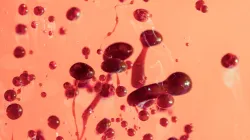7 unexpected signs that could point to blood cancer: Don't overlook these symptoms
Vigilance across all ages is key to combating blood cancer effectively. With early detection and rigorous treatment, this once formidable foe can often be vanquished.

Blood cancer, a pervasive ailment, often shadows the lives of children but can strike at any age. Each stage of life brings a variant of this insidious disease. Yet, it’s not just blood cancer that stirs concern; any irregularity within the bone marrow the lifeblood's factory demands vigilance. This marrow, the crucible of blood production, can malfunction at any age, leading to disorders that may eventually morph into blood cancer.
According to Dr Dinesh Pendharkar, Director- Sarvodaya Cancer Institute, Faridabad, in youth, blood cancer is prevalent. As age advances, bone marrow may falter, initially causing minor disruptions in blood production and later evolving into full-blown cancer. Hence, awareness of blood disorders from childhood through old age is crucial. The bone marrow crafts three vital components of blood: red cells, white cells, and platelets.
- When red blood cells falter, the body's oxygen supply dwindles. Early signs of blood cancer often manifest as unrelenting fatigue or weakness. This exhaustion can be profound and sudden, leaving patients noticeably drained.
- Another telltale sign is pallor; as red cell counts drop, the skin loses its rosy hue and turns pale.
- Platelets, essential for clotting, also suffer when the bone marrow ceases their production. This leads to excessive bruising and tiny red spots under the skin called petechiae. Unexplained bruises or these spots should raise alarms.
- Bleeding from gums during brushing or unexpected bleeding in urine or stool are additional red flags.
- White cells or leukocytes form our primary defence against infections. In blood cancer, their numbers fluctuate and their effectiveness wanes, resulting in frequent fevers that resist typical antibiotics over several days. Such persistent fevers warrant immediate blood tests.
- Weight loss is another common symptom across all cancers, including blood cancer.
- The disease also affects lymph nodes scattered throughout the body. Swelling in the neck, armpits, or groin known as lymphadenopathy can signal trouble.
Suspecting blood cancer necessitates thorough investigation through rigorous blood tests and bone marrow analysis via flow cytometry, a specialised cell study. Once diagnosed, prompt treatment is imperative as many forms of blood cancer are curable.
Especially in the elderly, blood cancers often progress slowly but insidiously. Symptoms like weakness, pallor, bruising, low-grade fever, or weight loss should prompt immediate medical evaluation. A prevalent condition in older adults is myelodysplastic syndrome—a precursor to overt blood cancer requiring serious intervention.
ALSO READ: What is Ovarian cancer? Know causes, signs, symptoms, treatment and precautions of the disease